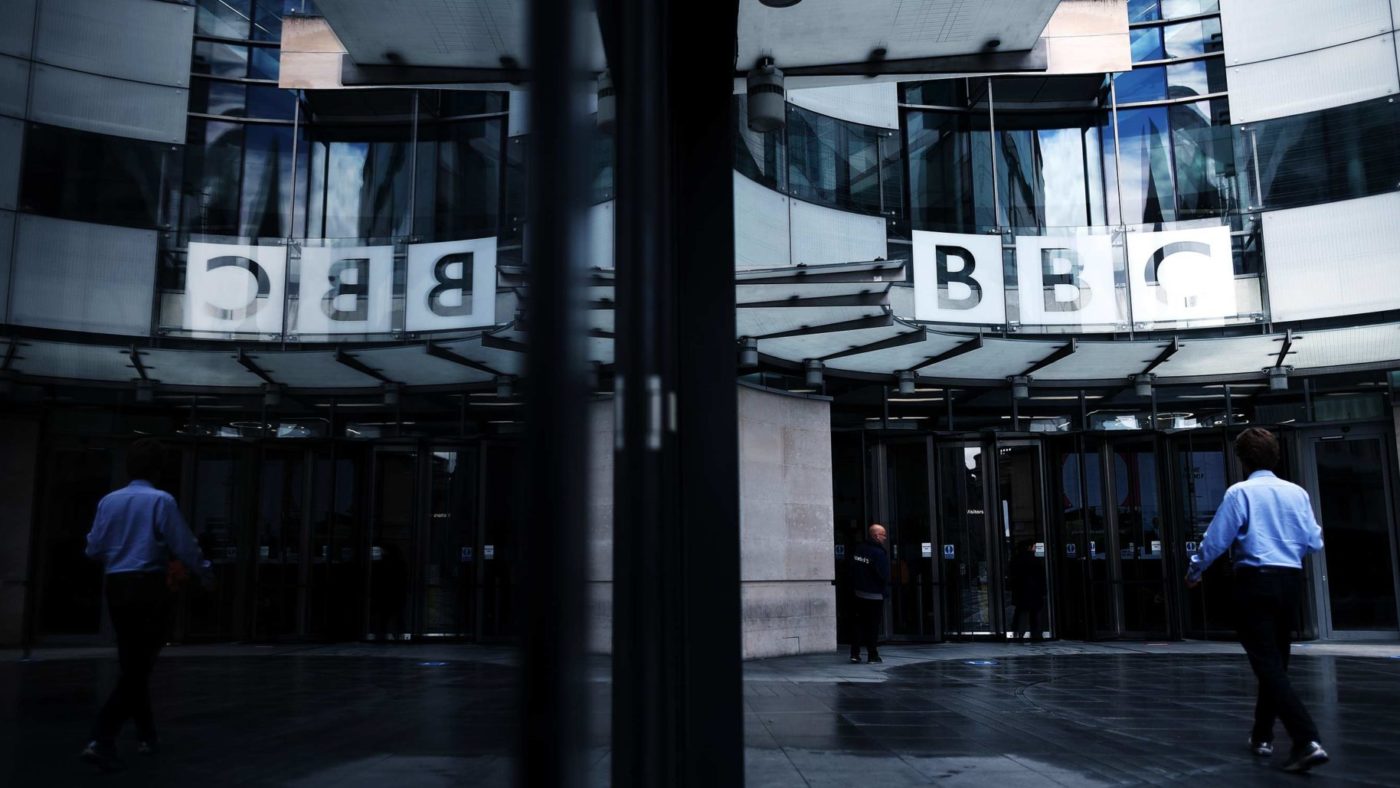On Saturday, some Bristol wag (or several Bristol wags) installed a mannequin of Jimmy Savile atop toppled slave-trader Edward Colston’s plinth. Attached to it was a sign reading “None of them stopped me, and your licence paid for it”.
As the latest salvo in that unhappy city’s ongoing statue wars it is difficult to top, a nuclear-tipped bullseye that captures the extent to which the UK version of Black Lives Matter is an elite preoccupation with BBC backing, while appropriate supervision of staff like Savile or even accurate and impartial coverage of the Grooming Gangs scandal is not. The US-inflected BLM “movement” is in the process of learning that put-upon Brits have a grim sense of humour.
The BBC, however — Lord Reith’s dearly beloved Aunty, set up to “inform, educate, and entertain” — is on notice. It is on notice because it’s losing people like me. Last week, I cancelled my TV licence. The BBC doesn’t inform or educate or entertain anymore. I suspect Reith would power London these days, given how fast he’s likely spinning in his grave.
Along with many of my “type” — upper-middle-class Shire Tories — I believe in the Lord Reith model of public broadcasting. I also prefer a form of user-pays where one can simply jump off the carousel to the funding model I saw as a girl in Australia. That country’s BBC-equivalent, the ABC, is funded from general taxation revenue for constitutional reasons (Australia’s founding charter forbids hypothecation). The Australian regime not only turns the national broadcaster into a political football every general election but prevents exit by those who’ve had enough. What I’ve just done is impossible.
The Beeb’s obvious bias is less of an issue; I have plenty of variety in my media diet. Rather, it’s the fat-headed presenter it got to host the Proms, various rubbish attempts at popular culture, and (latterly) woke nonsense imported from the US. I don’t want the BBC to serve up American wibble. It’s British.
To paraphrase Douglas Murray, I’ve written about wars more amusing than BBC Comedy. I’d rather redo the research for my first novel (which concerned, by turns, the Holodomor and Holocaust) than watch the painfully unfunny Nish Kumar. Every Sunday, I’m reminded the less BBC imbibed, the better. Instead of God and Gardening, soothing and useful by turns, we’re treated to endless three-minute, multi-guest ding-dongs directed to Twitter’s politics tragics and no-one else.
And if you’re going to make over-75s pay for their TV licence, you have to decriminalise non-payment. Imagine Aunty Beeb banging up Nan in the middle of a pandemic because she doesn’t pay the fine. One suspects — when the first prosecution occurs and some Windrush-vintage granny is dinged in court — the BBC will try to blame “Tory funding cuts”, despite the relevant legislation providing plenty of scope to recoup losses elsewhere.
As it stands, 72% of prosecutions for TV licensing evasion target women. When I was a baby barrister, more women were imprisoned for non-payment than they were for shoplifting (the only offence where female criminality routinely exceeds male). One in ten cases in the magistrates’ courts concern TV licence-evasion, with 140,000 prosecutions annually. The fine, on average, is £176. Many of the convicted are already struggling financially, so this makes their situation worse.
Mind you, even under a civil enforcement regime, TV Licencing’s ability to harass citizens is still considerable. Commercial solicitor Andrew Tettenborn points out it could make threats of court action, county court judgments, bailiffs, debt collectors, or loss of credit status. Yes, many people (usually middle-class) are often aware debt-collectors have been defanged since the Global Financial crisis. For those who don’t have much money, however, threats of this kind can induce unwilling payment. Yes, public anger in our post-Covid-19 world at BBC bullying is likely to get Windrush-nan off the hook, but that still leaves the problem of a state broadcaster that’s turned to shite unsolved.
What, then, have I done with my 13 quid spare a month? Rather than trousering it, it’s going to Triggernometry, a chat-show founded by Anglo-Russian comedian Konstantin Kisin and co-hosted with another comedian, Francis Foster. It offers the sort of thoughtful, long-form political-cultural discussion once embodied by…the BBC. “Unlike communism,” Kisin observes, “the BBC is a good idea that has ceased to work”.
There is no reason the BBC cannot find itself again. It may be dusty from abandonment, but the Lord Reith model of public broadcasting is still there, waiting to be taken down from the top shelf and put to use.
Click here to subscribe to our daily briefing – the best pieces from CapX and across the web.
CapX depends on the generosity of its readers. If you value what we do, please consider making a donation.


